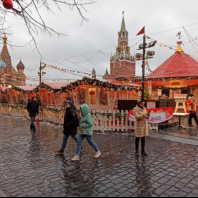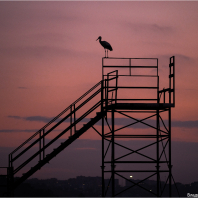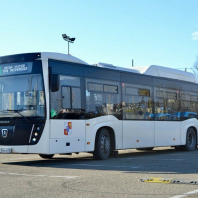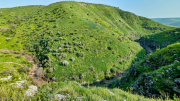Новый премьер Британии и российско-грузинская война
 markgrigorian — 12.05.2010
Теги: Кэмерон
Дэвид Кэмерон, ставший во вторник премьер-министром
Великобритании, оказывается, прилетал в Тбилиси 16 вагуста
2008 года как "представитель одной из старейших демократий
мира", чтобы поддержать "одну из новейших демократий".
markgrigorian — 12.05.2010
Теги: Кэмерон
Дэвид Кэмерон, ставший во вторник премьер-министром
Великобритании, оказывается, прилетал в Тбилиси 16 вагуста
2008 года как "представитель одной из старейших демократий
мира", чтобы поддержать "одну из новейших демократий".Побывав там, он призвал международное сообщество продемонстрировать России, что "путь, который она избрала, ведет к изоляции и презрению". Кэмерон потребовал исключить Россию из G8, приостановить переговоры о партнерстве между ЕС и Россией, и вообще, перестать выдавать россиянам визы: "русские армии не могут маршировать по другим странам, в то время как русские покупатели маршируют по британским магазинам" ("Russian armies can't march into other countries while Russian shoppers carry on marching into Selfridges").
(Цитирую по газете The Observer от 17 августа 2008 года)
А потом, 26 августа, он совместно с премьер-министром Чехии Миреком Тополанеком написал статью в Daily Telegraph под заголовком "Россия не может ограничивать свободу своих соседей".
Текст этой статьи (на английском, разумеется) я помещаю под кат.
Интересно, как поведет себя Кэмерон по отношению к России сейчас, уже как британский премьер, а не лидер оппозиции.
?The Daily Telegraph
26.08.08
Russia cannot limit its neighbours' liberty
The invasion of Georgia must not be quietly accepted by the West: remember the Prague Spring, warn David Cameron and Mirek Topolánek
by David Cameron and Mirek Topolanek
It is now more than two weeks since Russian forces moved into Georgia, and Russia continues to flout the terms of the ceasefire it signed. For Czechs, Russia's invasion of Georgia has had a particular historical resonance. Forty years ago, Moscow invaded Czechoslovakia. Tanks and troops rolled into the country to crush the so-called Prague Spring, the flowering of free speech and liberal reform.
What are the lessons of this unhappy anniversary for the modern world, in the aftermath of Georgia? The Europe of 2008 is very different to four decades ago. The Soviet Union and the Warsaw Pact no longer exist. Prague is the capital of a proud and free European nation, a member of Nato and the EU.
The Czech Republic has as neighbours fellow friendly democracies such as Poland and Hungary and, of course, Slovakia, whose peoples once again live in peace and freedom.
But if the differences are clear, one thing has not changed: the basic principles that mattered then matter as much today. Above all, our belief that free and democratic nations are entitled to see their territorial integrity respected.
So we need to be very clear in saying that Russia's behaviour cannot be condoned or excused. Whatever the wisdom of some of Georgia's actions, that is not a justification for a powerful neighbour to invade a small, sovereign country. Russia's pretext - that it has a right to step in militarily to protect its citizens - has chilling echoes from Czech history, and dangerous implications if it is now the basis of Russian policy. Such a doctrine cannot be allowed to stand.
Second, while the West made strong expressions of sympathy in the wake of the Prague Spring, there was a strong dose of Realpolitik thrown in. Western nations persuaded themselves that this was a quarrel within the Soviet camp and that Czechoslovakia was in the Soviet sphere of influence - an unwilling captive in Russia's backyard, doomed to stay there.
Not everyone accepted this morally ambivalent approach. Margaret Thatcher certainly did not, noting in her 1988 Bruges speech that "we shall always look at Warsaw, Prague and Budapest as great European cities''. At the time, it seemed to some a bold display of rhetorical bravado. To the Czech people, it was an inspiring message of solidarity.
This is relevant today. One cannot grant people only a part of their freedom and draw a line and forbid them to trespass across it. What applied in central and eastern Europe applies to Georgia and countries such as Ukraine today. We should not accept that while the Czech Republic, Poland and the Baltic States are in Nato and the EU, with their full measure of independence and liberty, other countries on Russia's periphery that have not yet become members are somehow condemned to exist in a political no-man's-land.
We must not return to the days of Yalta, when whole nations were allocated according to spheres of influence. If we go along with that in the case of Georgia, where will it apply next? Ukraine? Estonia?
Third, while no one wishes to see a return to confrontation and bloc politics, it is clear that - as in the Prague Spring - Russia hopes its actions will divide European nations among themselves, and divide the transatlantic community. So far, they have been disappointed. The EU and Nato have become more, rather than less, united as the Georgian crisis has evolved. It is essential that we remain united in the days and months to come.
We need to keep these points in mind as we fashion our long-term response to Georgia. It is clear that Russia sees its actions as part of a strategy to rein in its neighbours; in other words, that those countries enjoy only limited sovereignty and that if they act in ways, or elect leaders, that Moscow disapproves of they do so at their peril.
We must make clear to Russia that we want a positive relationship. We want Russia to be part of the rules-based international system, and bodies such as the World Trade Organisation. We must use the leverage we have - which means a more coherent European approach, for example, on energy. We may need Russian gas, but Russia needs our market.
We are fortunate that our generation grew up as the Cold War was passing into the history books and a happier era dawned, in which a more co-operative relationship with Russia seemed possible. We hope it still is. But we should not forget that the lessons of 1968 apply still in 2008 - that we must be strong and vigilant in defence of our values, and not look the other way when a small independent country is invaded by its neighbour.
?

 Интерактивное оборудование: современные технологии для бизнеса и образования
Интерактивное оборудование: современные технологии для бизнеса и образования  British Art. Художник Edward Burra 1905-1976
British Art. Художник Edward Burra 1905-1976  Вспомнил в Телеге про рождаемость миллиардеров
Вспомнил в Телеге про рождаемость миллиардеров  Аутлуков на Шарташе
Аутлуков на Шарташе  Андреева Е. Неизвестный Сканда: История культа одного из древнейших богов
Андреева Е. Неизвестный Сканда: История культа одного из древнейших богов  Байден возмущён намерением Цукерберга сократить цензуру
Байден возмущён намерением Цукерберга сократить цензуру  Новогодняя Москва
Новогодняя Москва  Наблюдатель
Наблюдатель  Новости автопрома. Автобус большого класса от «КамАЗа» на опытной эксплуатации
Новости автопрома. Автобус большого класса от «КамАЗа» на опытной эксплуатации 



